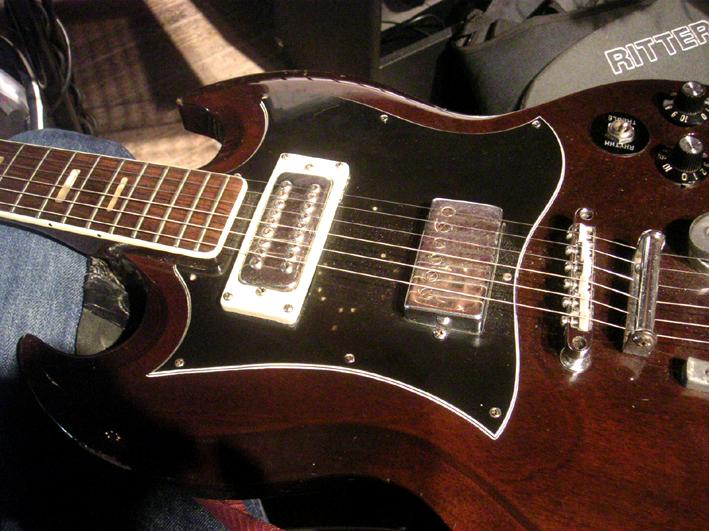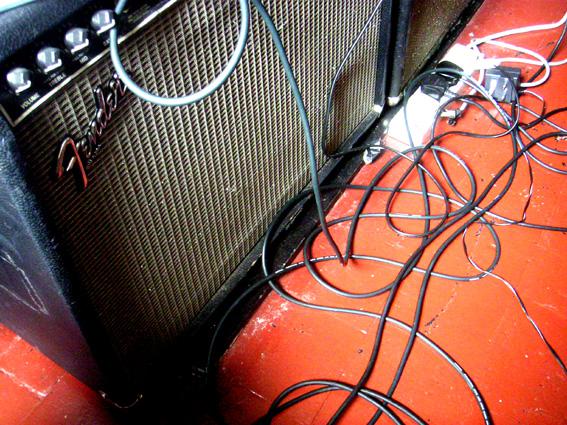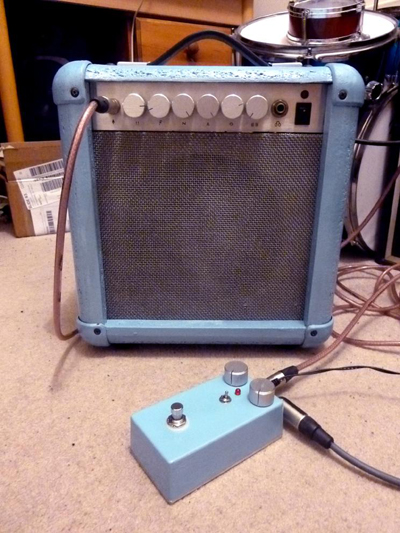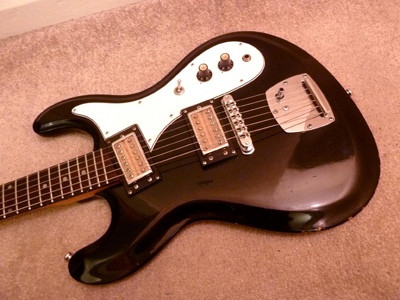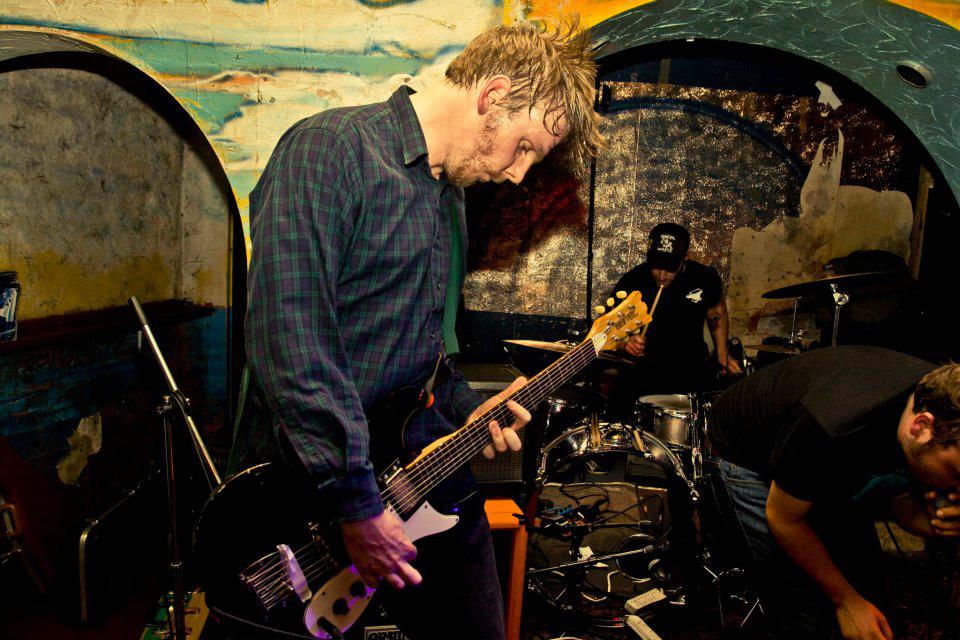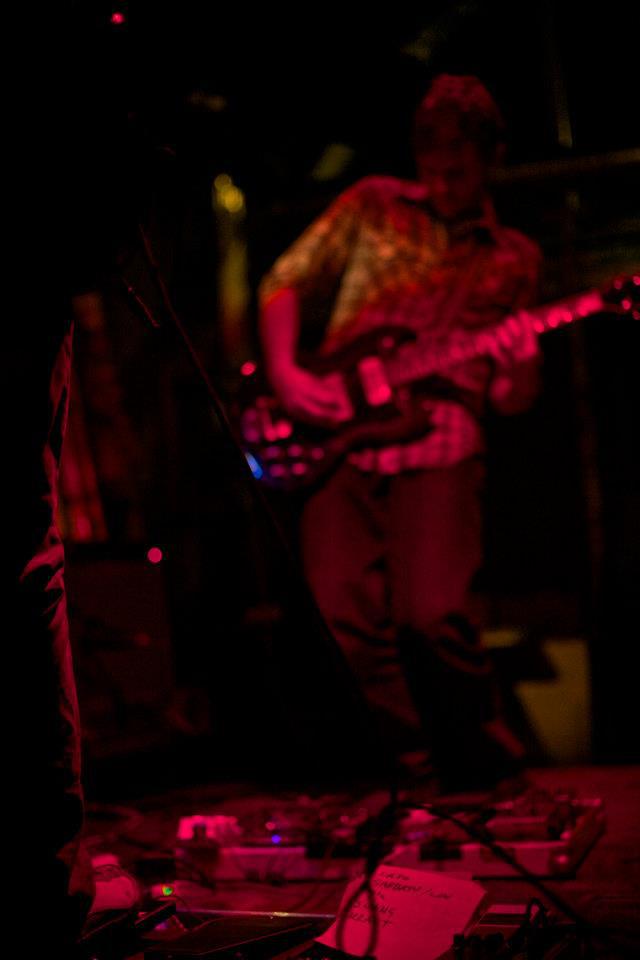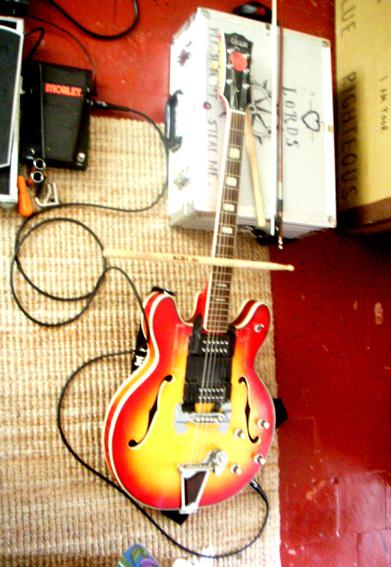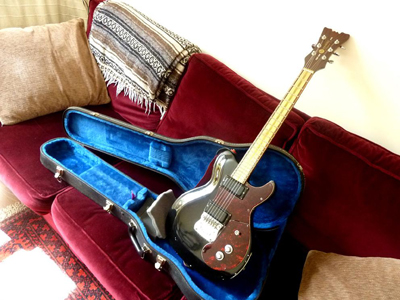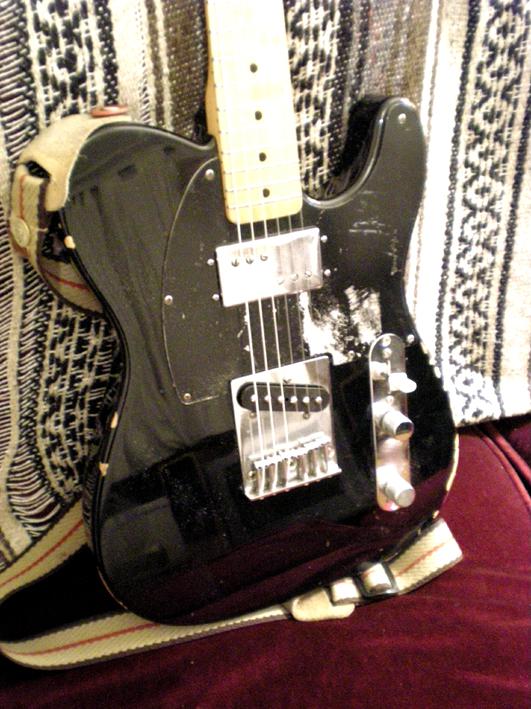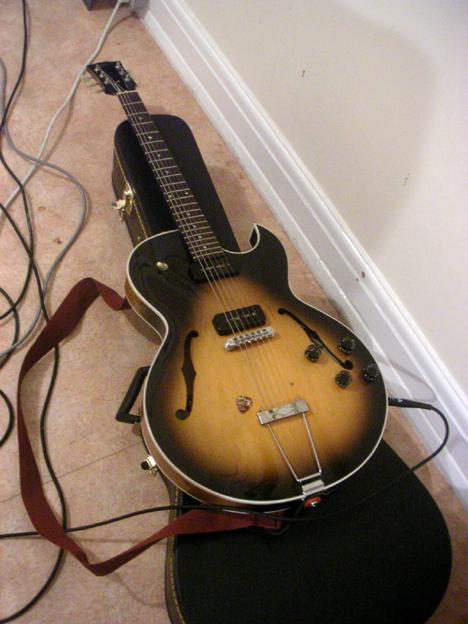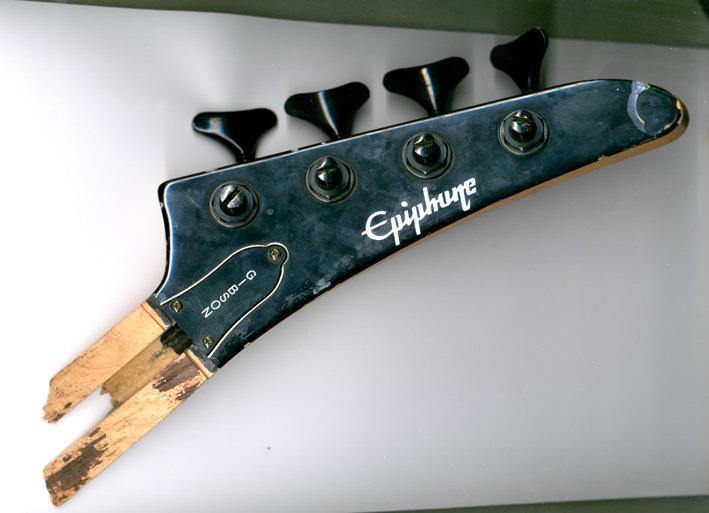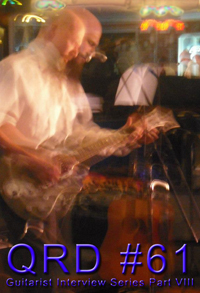
April 2013
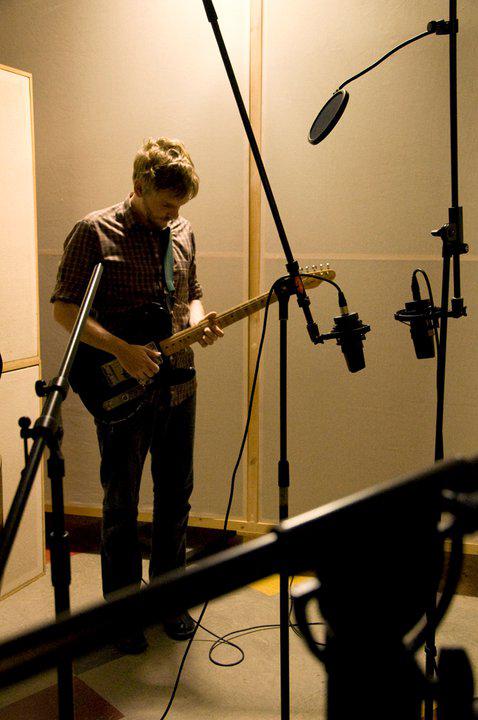
Bands: now – Kogumaza, Grey Hairs, Dusty Bible. Then – Lords, Felix, Wolves Of Greece, Last Of The Real Hardmen, Reynolds, Economy Of Motion, Stage Blood, more I have forgotten. Sometimes - Ex Easter Island Head, Damo Suzuki’s Network, Glenn Branca Orchestra.
Websites: www.honeyisfunny.com
QRD – What was your first guitar & what happened to it?
Chris – It was a 1970s “Made In Japan” copy of a Gibson 335 that I found in my uncle’s house & convinced him to swap a portable TV for. I still have it & it still gets used from time to time. My first guitar that I went to a shop & chose was a brand new Gordon Smith, the little Les Paul Junior type thing. I ended up selling that to my friend Marceline when she wanted to learn guitar. She sold it on, so I have no idea where it is now, which is a shame as I could have flogged it to Johnny from Hookworms for a fortune.
QRD – What’s your typical set-up from guitar to effects to amplifier?
Chris – I guess it depends on what band/project I’m doing but generally it’s the guitar into some type of volume boost/cut & then into some sort of pedal that gives me something to react to from time to time (i.e. a delay of some sort usually) & then into the amp. Maybe a bit of reverb on the amp if I’m feeling “atmospheric” (not often).
QRD – What’s the most important part of your rig - guitar, amplifier, or effects?
Chris – Again, it varies based on what band it is, but a lot of what I do is based on the sound being really full, so that’s always going to need a decent amplifier. I’d be happier playing a borrowed guitar & pedals through my own amp than vice versa.
QRD – What’s your main amplifier & why?
Chris – It’s an early 1990s Fender Twin. It was the first “proper” amp I bought & I’ve had it for about 17 or 18 years now. They’re not very popular amongst the cork sniffers who like valve amps so they’re always fairly cheap. There’s some good advice there: people who spend lots on premium gear are always going to say it’s amazing as they spent a fortune on it so think outside of that & save yourself some cash (i.e. Peavey made some killer amps in the 80s & they can be bought for pocket change, or found in a skip usually). The design of the Twin leaves a bit to be desired (the knobs stick out from the front by a half an inch or so, so you always end up shearing them off when you load the amp into a car), but I’ve stuck with it & I have a combo version & a head version (through an Orange cab). They’re really loud, lots of EQ options & you can run everything to both channels so you always have tons of clean headroom. I use the Dual Showman for bass as well as it sounds great for either. I also have a little 15 watt solid state amp I swear by for recording.
QRD – What’s your main guitar & what are the features that make it such?
Chris – At the moment it’s a 70s Univox Hi Flier. I went to Texas in 2007 & stayed with a friend over there & he had one & I just loved it straight away. The necks are really slim, the whole guitar weighs nothing & feels perfect for me (& they look cool & they’re pretty cheap). I helped him out of a tricky situation a few years later & to say thanks he bought me one from Nashville Craigslist, which was amazing of him.
Last year I got another one from Brooklyn when my girlfriend was on holiday there. I just saw it online back home in the UK & it was 2 blocks from where she was staying so I took it as an omen. It was a bit of a nail, but I got Xperience Guitars in Nottingham to totally rebuild it. They did an incredible job & that’s the one I use the most at the moment in Grey Hairs & just generally.
For Kogumaza I use a 70s Japanese SG copy. I got it off Ebay in about 2001 from a guy in Birmingham for 110 quid. It had the unbranded John Birch pickup in it when I got it & it’s a bit of a mystery. I tried to find out where it came from & John Diggins (who worked with John Birch) said it was a special order for an artist (hence it’s unbranded). I’m hoping Tony Iommi or Dave Hill, but I’ll never know.
I play bass for my friend Dusty Bible too. At the moment I’m using his violin bass from the 70s. I have a 70s Epiphone but it’s being restored at the moment - another “£100 to buy / £200 to restore” classic money-pit purchase from me. Both are short scale as I have the tiny hands of a child.
QRD – If you had a signature guitar, what would it look like & what would some of its features be?
Chris – I’d be pretty happy with anything that had a bolt-on neck, was nice & resonant but not super heavy, thin & shallow neck profile, decent bridge & high output pickups like P90s. Just one volume & tone. I like the slightly reversed Mosrite shape as well, so I guess what I am saying is: a Univox Hi Flier with all the faults ironed out. A Mosrite, basically.
QRD – If you had a signature pedal, what would it be & what would some of its features be?
Chris – Martin Cooper - an amazing gear boffin who runs Coopersonic - built me one for Kogumaza that I suppose is the closest to a “signature” pedal. It’s a type of delay that takes a weird glitch in the particular pedal it’s based on & then controls it with a wah-wah type pedal that’s attached. We call it The Cosmonaut. If it breaks I’m kind of screwed though. That or a Green Russian Big Muff with the tone control taped to zero & Jimi Hendrix painted on it.
QRD – How many guitars do you own?
Chris – Too many. Including ones that are in states of disrepair, I think I own 12. Most with a value of around 100 quid though.
QRD – How & where do you store your guitars?
Chris – I don’t really store them properly anywhere. Some are in hard cases at home or at the practice space or under my bed & some are just lent up in corners or on sofas.
QRD – What do you wish guitar cases had that they usually don’t?
Chris – A retractable bungee cord that you could wrap around the case so if the latches fail it doesn’t just spring open like a Jack-In-The-Box.
QRD – What features do you look for when buying a guitar?
Chris – I would love to have a technical answer, but I admit it’s mainly about how cool I think it looks. I admit it.
QRD – How much do you think a good guitar should cost?
Chris – I have guitars that were free, guitars that were £100 & then guitars worth four figures - they all have something valuable about them to me, so cost doesn’t really factor in with what makes something good - for me, anyway.
QRD – Do you upgrade & customize your guitars or just stick with what you get?
Chris – I tend towards cheaper guitars, mainly 70s Japanese stuff so I usually swap out the tuning pegs & the bridge for something more reliable. I occasionally change pickups if I really like a guitar, but not its sound & I just had a really cheap weird guitar I own sprayed a lovely turquoise colour. I had dot markers installed on the edge of the neck on my main Univox as well as I couldn’t see what fret I was on & Tipp-Ex kept rubbing off.
QRD – How thoroughly do you research or test a piece of equipment before buying it?
Chris – I’m pretty geeky about guitars & I’m always reading up on obscure brands so I definitely know a bit about what I’m after. The flipside of that is they’re usually really rare & in far off lands so testing them is impossible. Opening a packing box that’s arrived is always a bit of a shot in the dark. That’s why it’s handy to know some really skilled guitar repairers.
QRD – Do you change your rig around often?
Chris – Not really. A change in rig tends to mean a change in band or a substantial change in sound for that band. I think it was Neil Young who said guitars have songs in them & while that sounds a bit romantic for me, I certainly think that the limitations that certain gear has can be a positive when getting a new band or project together & a guitar or a piece of gear can inspire you to play a new way. So I only tend to swap things round if I’m trying to provoke a change of some sort.
QRD – Are you after one particular guitar tone & locking into it, or do you like to change your tone around a lot?
Chris – Depends on the band again really. For Grey Hairs it’s a really narrow scope for sounds, which is kind of deliberate. Just really loud & distorted & that’s pretty much it. Maybe some echo. For Kogumaza there needs to be more opportunity to vary the sounds so I have more devices to do that, but still there is a “sound” there that is constant under it all.
QRD – What are some guitars, amps, & pedals you particularly lust after?
Chris – How long have you got? I have a list of gear stored in my brain that, although I’m not actively seeking it out, I would be scrambling around trying to work out how to afford it if I ever saw any of it for sale. Not all of it is crazy expensive stuff I should add. I’d love an Acoustic Black Widow guitar, or a Ludwig Phase Synthesiser pedal or an Electro Harmonix Freedom amp, or a Maestro Echoplex & so on & so on. The one guitar I always lusted after though was a Mosrite Brass Rail. Semie Moseley (Mr. Mosrite) built these sporadically in 1976/77 ish. He built 34 of them apparently. They have a brass chassis running through the neck (bigger than a trussrod & visible on the fretboard) & they’re a real piece of craftsmanship. I can’t see how Semie ever thought he’s turn a profit on them, but he seems like he was the sort of guy to not really give much of a shit about that anyway. I love the story of Semie & I love the look of everything he built, but they’re way, way out of my price range usually. Earlier in the year I was amazed to find one for sale in America that I could just about afford & through a lengthy process of negotiation it’s currently on a plane heading my way. I hope it lives up to expectations….
QRD – What do you think are some important features to be on a person’s first guitar that aren’t always there?
Chris – Good tuners & a bridge that intonates. It’s good to know the guitar works well, so if it sounds out of tune it’s your own fault. Not that sounding out of tune is necessarily bad.
QRD – What have been the best & worst guitar related purchases you’ve made?
Chris – Best, financially, were buying Travis Bean guitars pre-Ebay. You could pick them up so cheaply & it was fun to hunt them down. I ended up selling mine for a big profit & it pretty much cleared the debts I had at the time. No regrets. I bought a 70s Telecaster Deluxe as well when they were still quite cheap & I still have that & it’s a beautiful thing.
Worst was a Guyatone Mosrite copy I got off Ebay. I felt ill when I saw it in the flesh when I went to collect it. I was with my friend Ian in this guy’s house & Ian just burst into howling laughter in front of the guy. He laughed too as I’d just agreed to give him way, way too much money for it. I didn’t laugh. In the photos it looked like a Univox but in the flesh it looked a bit like someone had carved it in CDT class. Straight back on Ebay…
QRD – What are some effect, amp, & guitar brands you particularly like or dis-like & why?
Chris – In terms of what I like: for guitars it’s anything Japanese made in the 70s basically. I love Japanese copies of big brand guitars. Like I said I’m a sucker for Univoxes, Mosrites, & Fender Telecasters too.
For amps: Fender, Hiwatt, JMP/JTM Marshalls, Sound City, Selmer, etc. Basically - loud, simple, bassy. I’d take a solid state bass amp from the 80s over most modern tube amps. If I am recording I go for something really small with reverb & a tone section that’s not too trebly & has plenty of mids.
As for pedals, I know folks with hundreds of fuzz & distortion pedals, but I’ve had a Sovtek Green Big Muff & a Fulltone FD2 forever & I’ve never found anything to beat them. I have lots of pedals, but I’m pretty unfussy about them, it seems easy to get so into pedals that you forget to make music sometimes, so as long as they work & are reliable I’m happy.
Dislikes: aside from the obvious stuff like “tone-lawyer” relic guitars that cost thousands of dollars, I’ve never really got on with Gibson guitars. I had a nice one (an ES135) that I recorded with a lot, but I never really bonded with it or felt right with it. I have friends with Gibsons that I really like so maybe I just haven’t found the right one (at the right price).
I am also (unfairly?) prejudiced against amps that have too many settings & knobs. Modern Marshalls, Blackstars, Engls, Mesa Boogies - that sort of thing. Channel switching & a big old 8 button footswitch is usually the tell tale sign. They always sound too thin & cheap & processed, but that could well be the person playing it at fault.
Basically, I’m a sucker for gear that’s in some way considered unusual. I’m on a band’s side before they start if they have a whole bunch of weird equipment that looks like they used their ears to select. Even when it breaks down/blows up/falls apart.
QRD – What’s the first thing you play when you pick up a guitar?
Chris – For some reason it’s “El Diablo” by ZZ Top. On the bass it’s “Jump Into The Fire” by Harry Nilsson.
QRD – How old were you when you started playing guitar?
Chris – 16.
QRD – At what age do you think you leveled up to your best guitar playing?
Chris – Mid 20s I think. That’s when I was probably most technically able & from then on it’s been a process of sort of “unlearning” to get where I want to be. Which is still a ways off.
QRD – Why do you think a guitar fits you more so than other instruments?
Chris – Guitar - electric guitar anyway - is kind of a blurry instrument. It can be something supportive & defining or it can be loose & characterful like a feature instrument in an orchestra & that’s a fun line to straddle, never really going too far off it. You can also make mistakes & be a little looser than with other instruments, as it doesn’t stick out so much if you do “fall off”. That suits me as I’m pretty imprecise & I like that chance to vary what I am doing from gig to gig or from one part of a song to another depending on how it feels at the time. I should add I’m not talking about “jamming”, just very slight variations to things to push or pull a song along. Plus, it seems like the electric guitar has infinite possibilities somehow. When you get in a rut there’s always something to haul you out of it, be it hearing something someone else does, or a new tuning or a new way to think of playing or even going back to something you haven’t done for a while. I’m always keen to see the guitar as a tool & not buy into the mythology of guitar playing but there is something kind of magic about it sometimes.
QRD – Do you think guitar should be people’s first instrument as often as it is?
Chris – My first instrument was the drums, but I was never very good so I saw my friends playing guitar & thought it looked an easier option (at least in terms of equipment). Guitar is a good starting point though, but it’s also quite frustrating when you’re young - the gulf between where you are & what you want to sound like is usually huge. Or it seems it. It’s good to remember you don’t need to be a virtuoso on guitar to make your own music with it. It’s good like that.
QRD – Do you see your guitar as your ally or adversary in making music?
Chris – Ally definitely. I’ve not run out of ideas on it yet - good or bad. I still love playing guitar.
QRD – Who are the guitarists that most influenced your playing & sound?
Chris – In terms of “famous” guitarists it’s Kurt Cobain for me in terms of first influences. It didn’t even occur to me to play an instrument until I got into Nirvana so it was lucky in a way. A lot of my friends were into metal & then made that sideways jump to Nirvana, but they really were the first band I ever liked at all really - so it was easy to go from them as a starting point & end up at Unwound or Nation Of Ulysses or The Wipers or Flipper etc. Being hit by Nirvana at that age was like someone opening a huge door to the rest of my life, for better or worse. They certainly led me to Sonic Youth & the idea of just approaching the guitar from a tuning & sound perspective, which is something that’s stuck with me.
Then I was lucky enough to be gigging almost straight away so the people who influenced me most were those around me like my friends Nick or Phill & then bands I met. Much as I love Jimi Hendrix & Sonny Sharrock (& they’re definite influences) what shaped me as a player is seeing people like Joe O Sullivan (Bilge Pump) or Neil & Ralph (Bob Tilton) or Steve Malley (Unit Ama) up close & often. Seeing how someone who is a peer & is operating at the same level as you do what they do is really amazing. I feel really lucky to have known so many really unique & incredible players.
In terms of how to approach guitar playing & making music in general, John Fahey is always going to be a big influence & it’s his later “electric” period that really continues to inspire. There’s something of a movement at the moment to re-contextualise him based entirely on his acoustic guitar playing & any analysis of the last period of his life is dismissed in comparison. But his later electric stuff like City Of Refuge & Womblife are really unique & interesting records. Fahey had dazzling technique on the guitar on his early records & it’s easy to be seduced by that & to try & decode how he did it & plenty of people, me included, have tried. But the epiphany (if you like) is that even when you can mimic him exactly (like so many people do at the moment), it’s still not him. It’s just a technical thing. You can do two things with that epiphany: you can carry on further into technique or you can abandon it & try something else. What’s remarkable is that Fahey himself seems to have had this epiphany. He talked about his acoustic records being comfort food, of them being lies he told to avoid his true feelings & that his later music was him confronting those feelings head on. Automatic technique versus something more thoughtful & honest to the self. That’s amazing & it bums me out that his career trajectory is seen as a boom & slump as opposed to a constant upward curve of discovery. It wasn’t his fingers, it was his *brain*…
QRD – Do you think people anthropomorphizing their guitars is natural or silly (e.g. naming their guitar)?
Chris – I don’t know… I guess I think of them as having personalities maybe. I think using expressions of lust & desire towards inanimate objects is a bit weird though.
QRD – What’s the most physical damage you’ve done to a guitar & how did you do it?
Chris – The band Wolves Of Greece existed between about 2000 & 2004. I think we did something like 35 gigs & produced under 30 mins of music. Really small returns. But I still have boxes of bits of equipment from that band. I don’t think any of us ever smashed a guitar up Pete Townshend style, but a lot of stuff got broken by accident. The paperweight on my desk at home is a headstock off a bass. The one that makes me wince was smashing the body horn (!) off a Les Paul Junior copy by throwing it backwards into my friend Jim & breaking his camera in the process. I smashed a black Telecaster at the 2nd or 3rd gig I ever played too as a result of youthful exuberance. Turned out well though as I had it fixed & I still have it, much modified & much loved, 17 years later. I’m not sure I could ever just pole-axe a guitar into bits. Seems cruel. Which maybe answers Question 28. Every time I see video of Kurt Cobain turning a Hi Flier into matchsticks I feel a bit sick. Plus - The Who. I mean: *The Who*. Come on.
QRD – What do you do to practice other than simply playing?
Chris – I occasionally sit & noodle on the sofa, but not very often. If I play guitar at home it’s usually working out some idea that’s got in my head at work or thinking, “What would happen if I tuned it to this?” & so on.
QRD – How many hours a week do you play guitar & how many hours would you like to?
Chris – It varies, but I would say on average 3 or 4 evenings a week I’m playing solidly, either guitar or bass. That’s just fine for me.
QRD – What type of pick do you use & why?
Chris – I still use whatever I found on the floor. I like the grey Jim Dunlop ones, but I recently found 30 of those neat Cactus grip ones on the floor at a gig in a pouch, so I’m working my way through them. They’re not my ideal thickness, but I can work around it. I used to have a pick with Billy Corgan’s face on it that my friend Neil stole for me when he roadied for the band Zwan. It was good slowly wearing away his huge bald head from gig to gig.
QRD – What gauge strings do you use & why?
Chris – I used to use the heaviest I could bare, as I love low end, but last year I slipped over & landed on my hand & damaged my ring finger. Since then I’ve had less power in that finger & it’s changed my playing a bit, so I’ve switched to a hybrid set of strings where it’s a really heavy bottom & a really light top & they seem to work. For Kogumaza the guitars are tuned weird so it’s a 52, two 28s & three 13s (I think).
QRD – How often do you change strings?
Chris – Not very often. If I’ve had a run of a few gigs I’ll change them because they’ll just be completely corroded, but I have some guitars that have strings on that are years old because of fiscal reasons (& sheer laziness).
QRD – How often do you break strings?
Chris – Hardly ever. I play pretty lightly; it’s usually corrosion from sweat that makes the strings go at the bridge end. I have more of a problem with electrics in guitars crapping out because my sweat runs under the pickguard & corrodes them. Most of my guitars have had their pots & wiring changed out at least once.
QRD – Which do you feel is more proficient, your strumming hand or fretting hand & how does that effect your style?
Chris – Strumming hand definitely. I’m not very fluid with my left hand at all & it’s why I tend to gravitate to open tunings. I’m definitely a rhythm player.
QRD – Do you set-up your guitar yourself or send it to a guitar tech (or not set it up at all) & why?
Chris – I do basic stuff myself, but anything involving the truss rod or making permanent changes to a guitar, I’ll send for the professionals. I am really, really clumsy.
QRD – What tunings do you use & why?
Chris – I’ve always used lots of different tunings, it’s a good way to take your brain out of normal patterns of playing & also, to be honest, it makes playing things easier as well. I’m not hugely dexterous so I tend to look to tunings to solve that & get out what I can hear in my head. My first band Reynolds used about 10 tunings; it was a total ball-ache with about 4 guitars & 2 basses at every gig. Wolves & Grey Hairs are both standard (or occasionally drop D). Felix was a bit like Reynolds in that I’d just tune to the open chord of the song & sometimes capo to make it easier. Lords was all Open D tuning for everything for both guitars. For Kogumaza, both guitars are unison-tuned to 3 octaves of the same note & then we sometimes capo to different points to each other. The idea with that is to make a huge power chord between the 2 guitars, in stereo across a stage. Or a huge mess, depending on how you see & hear it. Myself & Neil (other guitarist) played in Glenn Branca’s Orchestra & the tuning for that was a 2 octave version of this. Having a guitar around the house in that tuning showed how infinite the possibilities could be for something that, on the surface, looks like it might be really limiting. It’s just one note, you can’t do those little runs up a scale easily, but it’s that limitation that then opens the door to new possibilities.
QRD – Do you prefer tablature, sheet music, or some other notation system for writing down your own ideas?
Chris – I write stuff down in my own version of tab if I really need to remember it, but usually I figure if it’s a good part it’ll stay in the memory.
QRD – How high do you hold your guitar when playing (strap length)?
Chris – Somewhere in the middle. It’s hard to have a Univox Hi Flier anywhere other than as low-slung as it will go, Johnny Ramone style, but the cutaway at the top just perfectly frames my beer belly so I tend to hoist it up a tiny bit for dignity reasons.
QRD – What’s a bad habit in your playing you wish you could break?
Chris – I sometimes try & play too full & it’s a hangover from being in bands without a bassist I think. I just try & always play the biggest part I can to fill the sound & sometimes, when you step away & hear the whole band… then less is more.
QRD – Playing what other instrument do you think can most help someone’s guitar playing?
Chris – Drums definitely. Knowing how to slip in behind the beat or go ahead of it is crucial to guitar playing & feel, whatever “feel” is.
QRD – What’s a type of guitar playing you wish you could do that you can’t?
Chris – I’d love to have enough dexterity to be able to play what I’m hearing in my head in real time. You see people like Richard Thompson, Nels Cline, Marc Ribot, & especially Hendrix (around the Band Of Gypsys era) & the translation between their brain & their fingers is almost instant. The trick with those guys is that what they’re hearing is still exciting.
QRD – What’s a guitar goal you’ve never accomplished?
Chris – I don’t know. I think I’d like to do a fully improvised electric gig where I don’t use a looper & it’s not textural or ambient. I did some recordings like that that worked really well, but I’ve never had the bottle to do it live.
QRD – What’s the last guitar trick you learned?
Chris – I don’t think I learned it as much as stumbled on it, but there’s a neat trick where you basically punch the strings above the pickups to create a tremolo effect. Not good for string & pickup longevity though.
QRD – What’s your favorite guitar gadget (ebow, capo, slide, string cutter, etc)?
Chris – The capo has become more useful to me over the last few years for sure. I have a capo I cut apart with a knife that only capos 3 of the 6 strings that’s pretty handy.
QRD – What’s a guitar technique you’d like to master, but haven’t?
Chris – I’d love to be able to play a pedal steel really well.
QRD – Did you ever take guitar lessons & if so, what did you learn from them?
Chris – I’ve never had a proper lesson, but I’ve always asked people how they do things & asked them to show me if they can. My friends basically taught me to play.
QRD – What would you teach someone in a guitar lesson that you don’t think they would generally get from a guitar teacher?
Chris – I think being able to work the left & right hands like a drummer is really important, so I’d teach them how to play Bo Diddley style in open tuning so they get that on/off muting/strumming thing down as a natural thing even before knowing chords, etc. Also, a big revelation for me was that the same chord can be found in lots of locations on the guitar neck. Sounds stupid, but being able to just play a C chord in 4 or 5 spots on the neck is really useful & it unlocks the fretboard way more than learning scales will ever do.
QRD – What’s something someone would have to do to emulate your style?
Chris – If I have a “style”, I suppose it’s a rhythmic thing & dropping in & out around the beat. Making use of drone strings & tunings to fill out the sound is a constant too. Semitones in riffs maybe. I’m pretty predictable….
QRD – What’s your take on tremolo systems?
Chris – I have a Fender Jaguar & the best thing about it is the trem - I really like a Jag/Jazzmaster trem as they have a springiness that you can really connect with. Bigsbys too, though they’re less reliable. My Univoxes have trems; but they’re awful, so I’ve taken them off.
QRD – How often do you adjust your tone knob?
Chris – A fair bit. If I’m recording I usually have the tone right off for certain things & compensate on the amp, as it sounds better to me. I’m not much of a treble fan so I usually try & find a sweet spot.
QRD – What do you see as the difference between lead guitar & rhythm guitar players?
Chris – I think exclusively either is pretty dull, I gravitate to people who do both somehow. You’d never say Steve Cropper was either, or Hendrix or Greg Ginn or Chris Hamley from Circus Lupus, or John Reis or Greg Sage or Tony McPhee….
QRD – If a band has good guitar work, can you ignore the rest of the band not being good?
Chris – No - if anything I’m always about the drummer. I can ignore anything, even if only for a bit, if the drummer has a style that’s their own & is fun to listen to. I don’t know how much attention I pay to actual guitar playing in other bands other than checking out their equipment secretly.
QRD – What famous musician’s guitar would you like to own & why?
Chris – It’d have to be Kurt Cobain’s Mosrite Gospel or one of the Univox Hi Fliers he had. I like the look of the sunburst Phase I Custom he played on Saturday Night Live. Seeing that stuck in my head as a teenager & it’s probably why I play one now. I’d be happy to take that one off someone’s hands….
QRD – Who do you think is currently the most innovative guitar player & why?
Chris – Asa Osborne of Lungfish & Zomes is someone I know & mentioned before, but he plays guitar like no one else. Total economy, but total understanding of the sound & the physical nature of the electric guitar. His parts are so simple, but how he propels a whole band to sound the way they do is beyond deciphering. It’s more than just “this finger goes here; the amp is set to this.” Getting into Lungfish a long while ago really changed the way I looked at making music & the goals I set for myself when doing it. Not sure how much guitar Asa is playing these days though….
I’ve mentioned Joe O Sullivan & Steve Malley already as well, but they’ve always been people whose playing I think gets better & better. As they get older, they feel less worried about letting influences in that aren’t considered “cool” & it’s inspiring.
Other things that spring to mind are Terri & Andy from The Ex, Stef Ketteringham from Shield Yr Eyes, Loren Connors, Mick Turner, Nels Cline, Marc Ribot, The Boredoms, Branca, Ex Easter Island Head… &, of course, Tony Iommi.
QRD – Where can people hear your best guitar work?
Chris – That’s not for me to say, I’d be the last person to judge that. In terms of how I feel after finishing a record, I’d say the Kogumaza album is the closest I’ve come to getting the guitar in my head down on vinyl though. On the occasions I hear that record, I’m always a little bit surprised that it’s us playing it.
QRD – Anything else?
Chris – If I think about all the people I know across the world, the majority of them are friends because of my involvement with playing guitar. That’s pretty crazy when you consider it.








